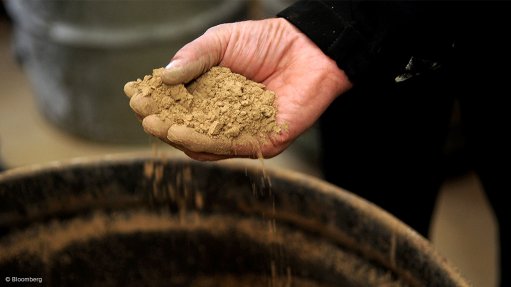
Photo by: Bloomberg
JOHANNESBURG (miningweekly.com) – The prefeasibility-level metallurgy on the Limpopo-based Glenover rare earths project has been completed, revealing the potential for operating company Glenover Phosphate to become a low-cost fertiliser and rare-earth oxide producer, mineral and energy project developer Ferminore CEO Alex Andersson said.
The mine, which was previously owned and operated by GoldFields, has a South African Code for Reporting of Exploration Results and Mineral Reserves-compliant indicated resource of ten-million tonnes and an initial 25-year project life.
Glenover aimed to produce over 500 000 t/y of diverse fertiliser products for the Southern and East African markets, as well as more than 6 000 t/y of rare earth oxide concentrates for export to its refining partner in Asia during a second phase in the development of the project.
Andersson pointed out that Glenover had been engaging with large global fertiliser companies with an interest in building a presence in the sub-continental markets through a “strategically placed” resource combined with a chemicals facility to be based in the Richards Bay industrial development zone, in KwaZulu-Natal.
A letter of intent had been signed with an international rare earth refiner and advanced discussions were under way with strategic fertiliser partners.
“Considering the balanced co-product environment, the company will enjoy considerable marketing flexibility, allowing it to compete aggressively in two long-term markets while gaining further credits from niobium and other secondary products,” Andersson noted.
Ferminore, which acquired Glenover Phosphate in 2000, designed and constructed a modular 2 000 t/m processing plant on site to produce single superphosphate in both granular and powder form, which was subsequently placed on care and maintenance in 2009 owing to market pressures.
The group moved to raise $9-million in 2010 through London-listed Galileo Resources, which was also a minority shareholder in Glenover, for early-stage funding for the new phosphate and rare earths exploration project.
Galileo previously explained that the in-depth prefeasibility-level metallurgy programme was being undertaken by a major State-owned rare-earth element (REE) laboratory, in China.
A “very positive” preliminary economic assessment (PEA) indicated that critical high-value REEs comprising neodymium, praseodymium and europium represented more than 28% of the total REEs in the deposit.
The PEA revealed that the potential openpit mine could be developed with an initial capital investment of $233-million and held the potential upside of recovering phosphate products, ammonium sulphate and scandium from process waste streams.